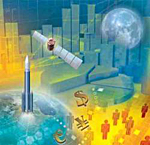
The United States remains the current leader in space competitiveness, but its relative position is eroding in the face of increased funding, streamlined policy, and industrial improvements in other space-faring nations.
The United States remains the current leader in space competitiveness, but its relative position is eroding in the face of increased funding, streamlined policy, and industrial improvements in other space-faring nations.
This is a conclusion of authors for the recently released third edition of the Futron Space Competitiveness Index: A Comparative Analysis of How Countries Invest in and Benefit from Space Industry. The U.S. still leads in each of the major categories: government, human capital, and industry. However, its comparative advantage is narrowing across all categories.
Analysis of space-based Positioning, Navigation, and Timing (PNT) comprises one of five focus areas in the study. The others are civil space exploration, military space, remote sensing, and the space technology capability base. In its November/December 2009 issue, Inside GNSS published an article by the authors of last year’s version of the study, focusing on PNT-related themes.
Other conclusions from the 2010 report include the assessment that although the overall international movement in space development has trended from competitiveness to cooperation, the entrance of newcomers is increasing friction.
“Dominant actors are increasingly challenged by a second and third tier of space leaders, and the competitive gaps among all nations are narrowing,” said Futron Chief Operating Officer Peggy Slye.
The annual index, first published in 2008, is designed to provide a comparative analysis of the actors, applications and drivers affecting the space landscape. The report primarily looks at three dimensions of competitiveness—government, human capital and industry—among the top players in space: Brazil, Canada, China, Europe, India, Israel, Japan, Russia, South Korea and the United States. In 2010, the report’s authors expanded its examination to include five emerging space actors: Australia, Iran, Singapore, South Africa and Ukraine.
According the report, the United States’ leadership role in space has been eroding for the three years the report has been published. The report points to the formulation of a new U.S. national space policy earlier this year as a step in the right direction by the United States in maintaining clear leadership.
But according to Futron CEO Joe Fuller, “To retain its leadership position, the U.S. must leverage its secret space weapon — American industry — and align it with strategy, policy and budget.”
In the meantime, Russia’s doubling of its space budget and renewed focus on monetizing national space investments made that country the clear winner in this report. The report cites Russia’s growing reputation as the partner of choice for agencies around the world — particularly emerging players — as the fuel that will continue to drive its program. Russia posted substantial improvements in all three dimensions due to updated government policy, increased transparency, formalized agreements to carry U.S. astronauts, and ongoing status as the world leader in number of annual launches.
The full report is available from Futron. The price is $199 for a single-user copy.
Purchasers of the full report will receive continuing segment analysis throughout the year, the company says, adding that this rolling delivery will provide up-to-the-minute data in the areas of civil space exploration; military space; positioning, navigation and timing; remote sensing and space technology capital base.





